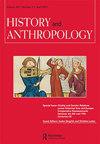Introduction. Unsettling encounters: Sites, knowledge exchange, and the making of religion in Southeast Asia and the Caribbean
IF 0.4
2区 历史学
Q3 ANTHROPOLOGY
引用次数: 0
Abstract
ABSTRACT This article introduces a special issue on practices of religious and scholarly knowledge exchange in Southeast Asia and the Caribbean. In both regions, the makings of religion have been informed by unsettling encounters between religious experts on the one hand and academic scholars of, and in, religion on the other. These encounters, we argue, can be revealed and productively analyzed through a focus on sites of learning and exchange, such as schools and universities, temples and monasteries, holy shrines, conferences and workshops, but also texts and archives. At such sites, alternative actors, referred to in this special issue as ‘strategic amateurs and accidental experts’, often emerge as unexpected agents of religious change. After explaining the central theme and approach, we draw together and synthesize two strands of argument found in the separate articles, respectively the centrality of moral geographies and geographic imaginations to the making of religion and the intriguing role played by performances of expertise, either as a form of gatekeeping in religious communities and institutions or as alternative sources of religious knowledge and authority. The article concludes with a reflective note on the role of scholars in both fortifying and destabilizing understandings of region and religion.介绍。令人不安的遭遇:地点,知识交流,以及东南亚和加勒比地区的宗教形成
本文章由计算机程序翻译,如有差异,请以英文原文为准。
求助全文
约1分钟内获得全文
求助全文
来源期刊

History and Anthropology
Multiple-
CiteScore
1.80
自引率
0.00%
发文量
41
期刊介绍:
History and Anthropology continues to address the intersection of history and social sciences, focusing on the interchange between anthropologically-informed history, historically-informed anthropology and the history of ethnographic and anthropological representation. It is now widely perceived that the formerly dominant ahistorical perspectives within anthropology severely restricted interpretation and analysis. Much recent work has therefore been concerned with social change and colonial history and the traditional problems such as symbolism, have been rethought in historical terms. History and Anthropology publishes articles which develop these concerns, and is particularly interested in linking new substantive analyses with critical perspectives on anthropological discourse.
 求助内容:
求助内容: 应助结果提醒方式:
应助结果提醒方式:


